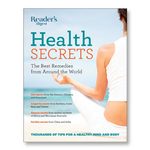Do You Fall for the ‘Nocebo Effect’? 5 Ways to Stay Positive for Better Health
Updated: Aug. 03, 2015
Scientific studies confirm that a placebo (a dummy medication or procedure) can genuinely benefit a person's health. But its sinister cousin, the "nocebo effect," creates expectations of harm, which can lead to seriously negative health consequences.
 A patient’s expectations of a treatment clearly influence the way it works. The authors of a 2012 German study note that vulnerable, ill, or injured patients are highly receptive to negative suggestion. A participant in one drug trial developed dangerously low blood pressure by “overdosing” on what he thought was an antidepressant—only when he learned that it was an inert substance did his blood pressure return to normal. (Conversely, the power of positive suggestion may explain some of the success of complementary therapies—from herbal remedies to homeopathy). The more strongly a patient believes in the treatment, the more likely it is to be effective. Here are some ways you can put this knowledge to practice:
A patient’s expectations of a treatment clearly influence the way it works. The authors of a 2012 German study note that vulnerable, ill, or injured patients are highly receptive to negative suggestion. A participant in one drug trial developed dangerously low blood pressure by “overdosing” on what he thought was an antidepressant—only when he learned that it was an inert substance did his blood pressure return to normal. (Conversely, the power of positive suggestion may explain some of the success of complementary therapies—from herbal remedies to homeopathy). The more strongly a patient believes in the treatment, the more likely it is to be effective. Here are some ways you can put this knowledge to practice:
1. Get authoritative information Before having treatment or taking medication, get advice from a reputable source. The Internet is a vast repository of information but obviously not all of it is reliable. If you have a tendency toward hypochondria, it can be more harmful than helpful, as the nocebo effect is known to influence those who have a pessimistic outlook more powerfully than those with a more balanced attitude.
2. Control your response to health experts who are treating you. Focus on encouraging phrases, such as “most people tolerate this well” or “this shouldn’t hurt.” Try to tune out the negative comments, such as “this may be painful,” “expect a long recovery time” or “you may find that this treatment makes you feel sick.”
3. Engage your mind Use creative imagery to stay positive while you recover from illness. If you are in pain, for example, it may help to imagine tight muscles being massaged, visualize the muscle fibers separating and relaxing, and to concentrate on feelings of warmth. As you visualize, try to focus on your breathing and imagine that you are relaxing in the sunshine or floating in a pool.
4. Use the power of touch Studies have shown that the touch of a partner, friend, or health practitioner can benefit conditions as diverse as asthma, arthritis, hypertension, and migraine. Touch therapy has also been proven to reduce pain and accelerate wound healing. Even if, as some maintain, this is a placebo effect, it is the end result that is significant.
5. Keep positive There is overwhelming evidence that those who heal fastest maintain a positive attitude, take responsibility for their own health, and focus on getting well. Self-awareness also helps, especially of attitudes that may hamper your health.
 More of the World’s Best Health Secrets
More of the World’s Best Health Secrets
Packed with wisdom of tribal societies as well as top academic institutions, Reader’s Digest Health Secrets delivers thousands tips to boost your memory, clean up your diet, stave off chronic disease, and more. Learn more and buy the book here.